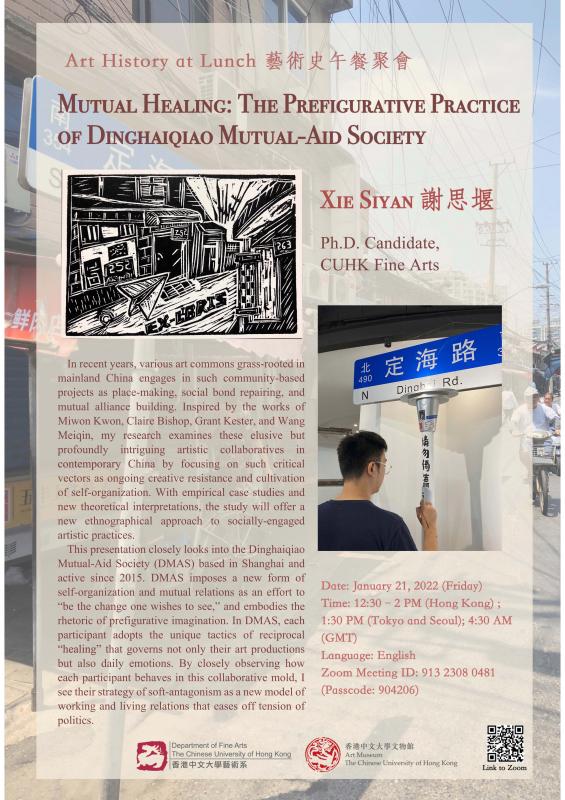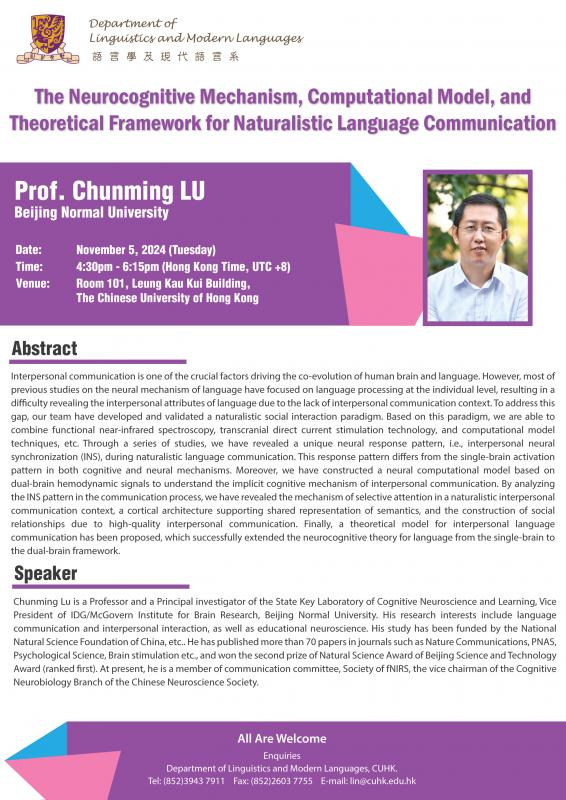Art History at Lunch - Mutual Healing: The Prefigurative Practice of Dinghaiqiao Mutual-Aid Society
World History Seminar (2021-22) Lecture 1: World History Roundtable: ‘What is World History?’

Moderator: Prof. Ian MORLEY (Department of History, CUHK)
Panellists:
Prof. Gregory GORDON (Faculty of Law, CUHK);
Prof. Stuart MCMANUS (Department of History, CUHK);
Prof. Ryan MITCHELL (Faculty of Law, CUHK);
Prof. James MORTON (Department of History, CUHK);
Prof. PUK Wing Kin (Department of History, CUHK);
Prof. Christopher ROBERTS (Faculty of Law, CUHK);
Prof. Noah SHUSTERMAN (Department of History, CUHK)
Conducted online via ZOOM (Meeting ID: 990 8868 4183)
https://cuhk.zoom.us/j/99088684183
Other Upcoming Events
Lecture Series on Legal History in the New Territories: 新界沿用的中國法律和習俗: 一些有關新界傳統土地信託事宜
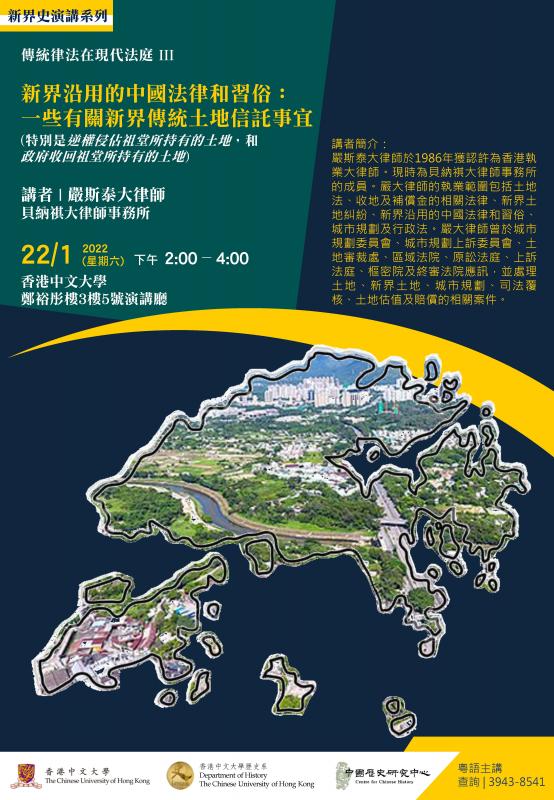
Speaker
Mr. Valentine S.T. YIM, Bernacchi Chambers
嚴斯泰大律師於1986年獲認許為香港執業大律師。現時為貝納祺大律師事務所的成員。嚴大律師的執業範圍包括土地法、收地及補償金的相關法律、新界土地糾紛、新界沿用的中國法律和習俗、城市規劃及行政法。嚴大律師曾於城市規劃委員會、城市規劃上訴委員會、土地審裁處、區域法院、原訟法庭、上訴法庭、樞密院及終審法院應訊,並處理土地、新界土地、城市規劃、司法覆核、土地估值及賠償的相關案件。
Other Upcoming Events
CUHK Regional Virtual Fair - ARTS
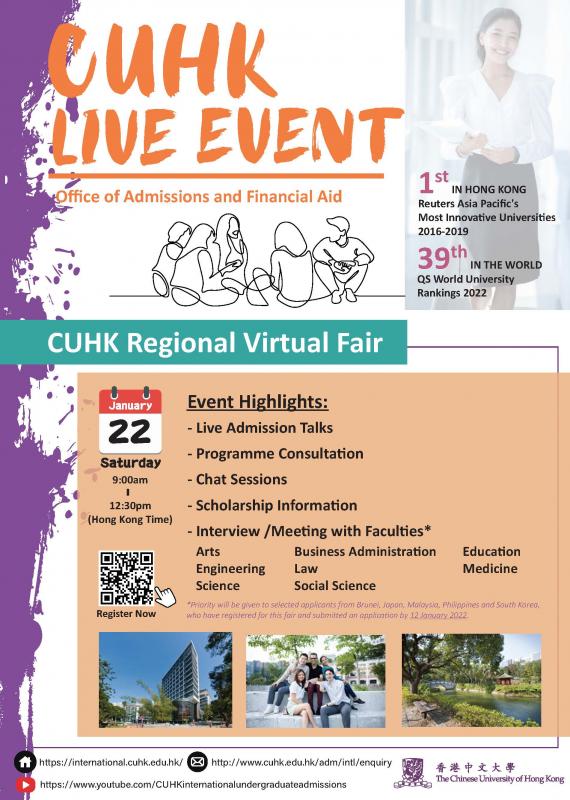
Office of Admissions and Financial Aid is going to organise the third Virtual Regional Fair on 22 January 2022 (Sat). There will be programme consultation and taster lectures of humanistic education offered by Faculty of Arts. If you are interested in joining the event, please visit the webpage of CUHK Regional Virtual Fair.
Other Upcoming Events
Book Launch Event (Hong Kong)-Chinese Edition of Celluloid Comrades

This event will be conducted in Cantonese.
簡介
到底膠卷是如何遇上同志?同志又如何遇上膠卷?
九十年代的《膠卷同志》有些甚麼特色?
而九十年代之後「膠卷同志」的命途又是如何?
是次書會邀請到兩位「膠卷同志」林松輝與鄧芝珊由自身經驗出發,細說同志與電影這兩個關鍵詞如何在他們的生命中交織在一起。
林松輝憶及他如何遇上像《春光乍洩》和《愈快樂愈墮落》這堆男同志電影,又如何看見同志透過膠卷走入公共世界;鄧芝珊則從與同志電影及同志影展的結緣出發,訴說如何把實踐延展至當下的同志維權與日常。
《膠卷同志》不過是開始,膠卷之外的同志命途亦是值得關注。
主講|林松輝/《膠卷同志》作者、香港中文大學文化及宗教研究系教授
鄧芝珊/嶺南大學文化研究系副教授
主持|譚以諾/手民出版社主編
主辦:手民出版社
協辦:香港中文大學文化研究中心
Enquiry
Other Upcoming Events
The Study of the History of Cantonese: A Case Study of the Question Particle me1

Since the 1990s, scholars have been drawn to the study of a collection of materials written in Chinese dialects. The materials were published between the 19th and the mid-20th centuries and include dictionaries, textbooks and Bible translations, Chinese classics, plays and novels. Some were compiled by foreigners while some by native speakers. They enable us to have a glimpse into the Cantonese language spoken two centuries ago such as usages that were found at the time but no longer exist nowadays and the development or changes that a word or construction has undergone in the last two hundred years. The first part of the talk will provide an overview of the historical materials that serve as the basis of the study of the history of Cantonese.
The second part of the talk shows how the historical materials can help us trace the development and uncover the origin of a word with the case study of the question particle me1. Specially, me1 was used to mark both biased and unbiased questions two centuries ago and its vowel was rendered as e and i, facts based on which Yiu (2021) proposes the following developmental path for me1: negative marker m4 + the sentence-final particle ni1 > mi1 > me1. Meanwhile, me1 has developed from a question marker to a discourse marker.
Speaker:
Professor Yuk Man Carine YIU (The Hong Kong University of Science and Technology)
Carine Yuk-man YIU is Associate Professor in the Division of Humanities, the Hong Kong University of Science and Technology. Her research interests lie primarily in syntax, semantics, typology, historical linguistics and Chinese dialectology. In recent years, she has studied the historical materials written in Chinese dialects such as Cantonese, Hakka, Min, Wu and Mandarin. She is the author of The Typology of Motion Events: An Empirical Study of Chinese Dialects (De Gruyter Mouton, 2014) and has published research articles in journals such as《方言》[Dialect], 《中國語文》[Studies of the Chinese Language], Bulletin of Chinese Linguistics, Journal of Chinese Linguistics, Lingua and Language and Linguistics. She is also one of the guest editors of the Language and Linguistics Monograph《早期漢語方言語法》[Grammar of Early Chinese Dialects] (forthcoming). With the funding support of the Research Grants Council of Hong Kong, she constructed the “Early Cantonese Tagged Database” and “Database of Early Chinese Dialects”. Her current project is on the word order and word order variations in the history of Chinese dialects.
Other Upcoming Events
Transformer Architectures as Models of Syntagmatic and Paradigmatic Relations in Human Language
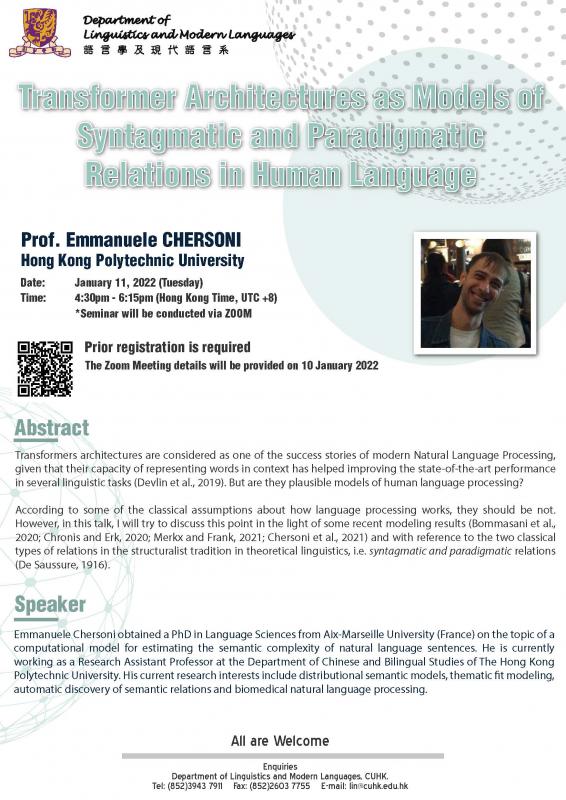
Transformers architectures are considered as one of the success stories of modern Natural Language Processing, given that their capacity of representing words in context has helped improving the state-of-the-art performance in several linguistic tasks (Devlin et al., 2019). But are they plausible models of human language processing?
According to some of the classical assumptions about how language processing works, they should be not. However, in this talk, I will try to discuss this point in the light of some recent modeling results (Bommasani et al., 2020; Chronis and Erk, 2020; Merkx and Frank, 2021; Chersoni et al., 2021) and with reference to the two classical types of relations in the structuralist tradition in theoretical linguistics, i.e. syntagmatic and paradigmatic relations (De Saussure, 1916).
Speaker:
Professor Emmanuele CHERSONI
The Hong Kong Polytechnic University
Emmanuele Chersoni obtained a PhD in Language Sciences from Aix-Marseille University (France) on the topic of a computational model for estimating the semantic complexity of natural language sentences. He is currently working as a research Assistant Professor at the Department of Chinese and Bilingual Studies of The Hong Kong Polytechnic University. His current research interests include distributional semantic models, thematic fit modeling, automatic discovery of semantic relations and biomedical natural language processing.
Other Upcoming Events
Break Out S2 (4): LI Shuangzhi (China) and YANG Zi (China)
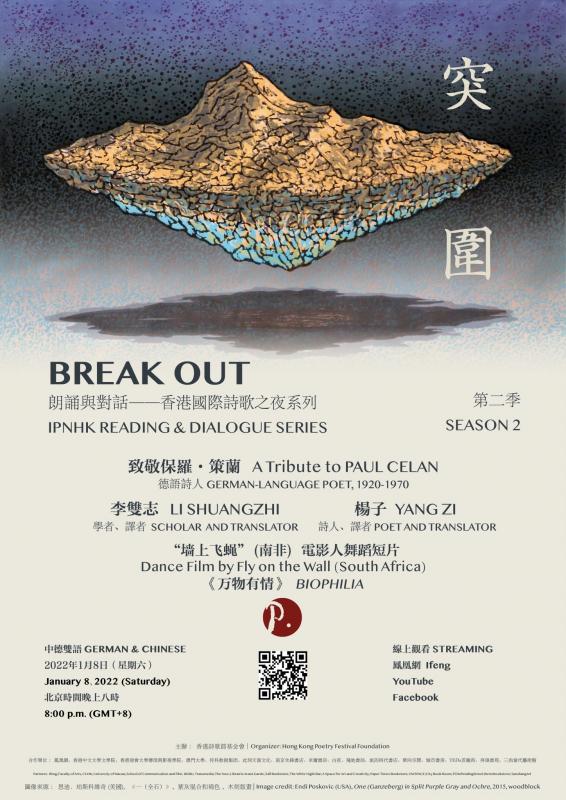
With the Faculty of Arts of the Chinese University of Hong Kong (CUHK) as one of its sponsors, the Hong Kong Poetry Festival Foundation (HKPFF) has launched Season 2 of Break Out: IPNHK Reading & Dialogue Series in November 2021.
In the latest event of the series, Chinese scholar and translator Shuangzhi Li will join Chinese poet and translator Yang Zi for a live conversation about a tribute to German-language poet Paul Celan. The program will be broadcast on 8 January 2022 at 8:00pm via Ifeng, Facebook and YouTube.
Poet and Translator
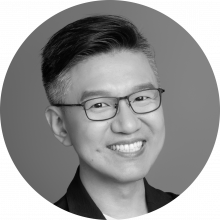
Shuangzhi Li
Junior professor for German studies in Fudan University
Shuangzhi Li, Junior professor for German studies in Fudan University. He studied German language and literature in the Peking University and Freie University Berlin and finished his Phd program there. Further, he held a postdoctorate position in University Göttingen, before he started to work in Shanghai. His main interests lie in the modern and contemporary German literature studies and aesthetic theories. He published a German book and two Chinese books and works as a deligent translator as well. His translations include literary works and academic books like Hofmannsthals poems and “The structure of modern lyrics”.
Show All +
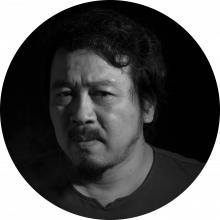
Yang Zi
An acclaimed contemporary Chinese poet
Yang Zi, an acclaimed contemporary Chinese poet, is the author of a dozen books, including Border Fast Train (1994), Gray Eyes (2000), and Rouge (2007). After his university studies in Chinese literature, he lived in Xinjiang Uygur Autonomous Region for nine years and cofounded the literary journal Big Bird. In 1990, he was appointed Vice Alderman of Tahaqi Village. Since 1993, he has lived in the southern coastal city of Guangzhou and now works as the associate chief editor of the Nanfang People Weekly. Also known as a poetry translator, he has introduced the works of Osip Mandelshtam, Paul Celan, Fernando Pessoa, Gary Snyder, Charles Simic, and other Western poets to Chinese readers.
Show All +
Other Upcoming Events
Womenomics and the Body
This talk captures Japanese women's changing stance towards the low-dose birth control pill in light of Womenomics, the government's policy platform during the 2010s for boosting women's labor participation.

Women have largely rejected it as contraception, but around this time began accepting its uses for therapeutic regulation to "control" their bodies. While liberal feminism prizes economic empowerment and technologies, such as the Pill, that effectuate such outcomes, my ethnographic research finds that the sense of control offered by the Pill is not necessarily emancipatory. Stories from Japanese women who themselves use the Pill overwhelmingly suggest that they do so as the consequence of overwork and growing precarity, in order to prevent their bodies from becoming "broken" from the stresses of living in an unequal society. In arguing that the Pill's appeal is premised on controlling women's bodies to extract labor, this talk's attention to the somatic effects of precarious work continues to challenge the notion that women are empowered through work.
Speaker
Dr. Shoan Yin CHEUNG
(Williams College, USA, and the University of Hong Kong)
Dr. Shoan Yin Cheung is an ethnographer of medicine, technology and the body in East Asia. Her research focuses on reproductive technologies and their intersections with bodily epistemologies, moral orders, and the logics of governance in late capitalism.
Enquiry
Misaki Nagaoka (mnagaoka@cuhk.edu.hk)
Other Upcoming Events
Ancestral Shade: Kinship and Ecology in Southeastern China
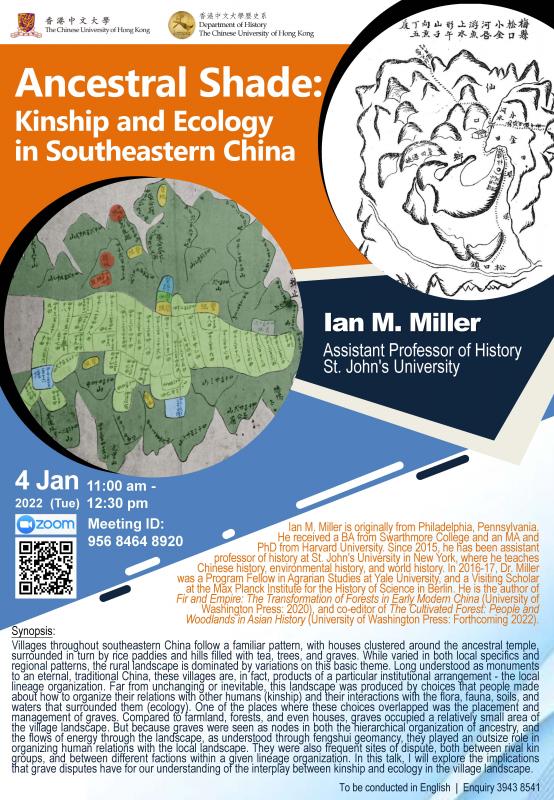
Synopsis:
Villages throughout southeastern China follow a familiar pattern, with houses clustered around the ancestral temple, surrounded in turn by rice paddies and hills filled with tea, trees, and graves. While varied in both local specifics and regional patterns, the rural landscape is dominated by variations on this basic theme. Long understood as monuments to an eternal, traditional China, these villages are, in fact, products of a particular institutional arrangement - the local lineage organization. Far from unchanging or inevitable, this landscape was produced by choices that people made about how to organize their relations with other humans (kinship) and their interactions with the flora, fauna, soils, and waters that surrounded them (ecology). One of the places where these choices overlapped was the placement and management of graves. Compared to farmland, forests, and even houses, graves occupied a relatively small area of the village landscape. But because graves were seen as nodes in both the hierarchical organization of ancestry, and the flows of energy through the landscape, as understood through fengshui geomancy, they played an outsize role in organizing human relations with the local landscape. They were also frequent sites of dispute, both between rival kin groups, and between different factions within a given lineage organization. In this talk, I will explore the implications that grave disputes have for our understanding of the interplay between kinship and ecology in the village landscape.
Speaker:
Dr. Ian M. MILLER
Assistant Professor of History, St. John’s University
Conducted online via ZOOM
Meeting ID: 956 8464 8920
(https://cuhk.zoom.us/j/95684648920)

